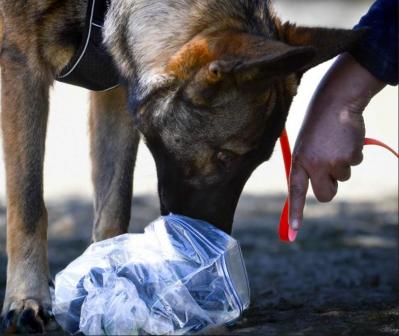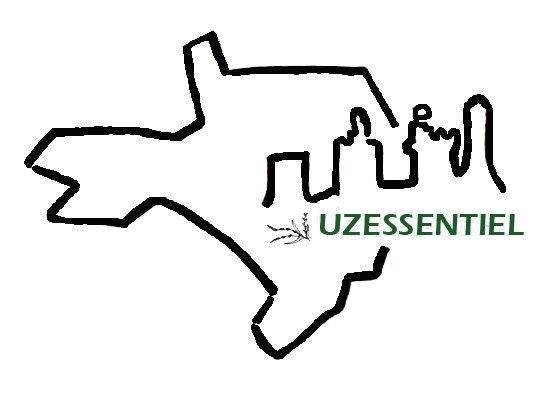Focus on dog's education with Perrine Vuche (part 2)
- Par nbesse
- Le 30/09/2024
- Dans Living in Uzès and around
FR - After an initial introduction to dog training by Perrine Vuche, founder of The Dog's Compagnie, we invite you to read the second part of our article, about family life, rehabilitation, mantrailing...
|
Mantrailing is "an activity that helps you strengthen the handler-dog relationship, and helps you learn to read your dog properly. Mantrailing makes it possible to follow an individual scent trail in highly contaminated terrain (saturated with odours). We rely on the dog's natural abilities during the course without using force or coercion. Dogs trained in mantrailing are capable of following tracks after several hours"... source
|
You have created several approaches to dog training, such as Education and behaviour around the arrival of a baby in the family, an event that can be disruptive for animals, Rehabilitation (following an illness or accident), Mantrailing & nosework (for private individuals and search brigades)... Can you tell us about them?
In 2016, a family adopted a dog from the shelter I worked with. The couple were expecting a happy event and the baby's arrival didn't go as well as they'd imagined. They even thought about taking him back to the shelter during this vulnerable period. At the time, there was nothing on the subject in France, and little or nothing was said about it. I discovered the "Family Paw Parent Education" programme in the United States and took the 18-week course to obtain the necessary certification to follow the families and prepare the dog for life afterwards, with a baby. There are currently 2 of us certified in France.
A dog that barks a lot isn't necessarily seen as a problem... but with a baby, it can become one, as can a dog that jumps, chews, destroys, pulls on the lead... We sometimes tolerate certain things at one stage of life, less so at others.
 For mantrailing and nosework, it was a revelation in 2017 after trying out almost all dog activities, without really finding the one that made me tick. I can only teach what inspires me deeply, it's part of my personality. Since that discovery, I've been training regularly so that I can offer my clients the highest possible level of quality.
For mantrailing and nosework, it was a revelation in 2017 after trying out almost all dog activities, without really finding the one that made me tick. I can only teach what inspires me deeply, it's part of my personality. Since that discovery, I've been training regularly so that I can offer my clients the highest possible level of quality.
To explain briefly, mantrailing is the search for lost people. We are dealing here with the search for people in the strict sense of the word. We can work in the countryside, in urban or suburban areas.
As for nosework, it's the detection of target odours. The dog learns to 'mark' (indicate) a previously learned scent. In practical terms, this is what happens, for example, when searching for drugs or explosives.
These two disciplines, whose origins are primarily utilitarian, can be turned into fun activities. Apart from the fact that these disciplines are fascinating to observe and experience with your dog, they are also particularly interesting from a psychological and relational point of view. It develops the animal's self-confidence and the confidence you can have in it. They are also very interesting for dogs with a high level of energy: 20 minutes of scent-seeking is equivalent to 1 hour of physical exertion.
Dogs who have difficulty controlling their emotions on a daily basis also stand to gain, as nosework improves impulse control and concentration. As it can be practised by dogs of all ages, I personally see nothing but benefits!
What has been your greatest challenge in your career?
There have been so many in 16 years! However, I think it was writing my book Un chien dans la Famille (A Dog in the Family), which we finalised during the pandemic with my colleague Eloïse Desmaris. This period when the world was at a standstill enabled us to give birth to the book we'd both been dreaming of.
One last question... Do dog trainers also work in collaboration with vets? If so, in what way?
Yes, of course, our profession is inextricably linked with the veterinary profession, which are our partners of choice in many issues. The medical aspect is often overlooked when it comes to behavioural problems. Annoying behaviour can be caused by pain, hormonal imbalance or an underlying pathology, etc.
I often ask to consult a vet before we meet, or work with vets (behaviourists or otherwise) in certain long-term care situations. Occasionally, a dog is medicated (this represents between 2 and 4 cases a year for me, a rather low ratio). However, this practice, which is sometimes "demonised" by certain dog trainers due to a lack of knowledge, enables dogs to be able to evolve in situations where they would otherwise be unable to do so... The outcome can then be dramatic for everyone.
When a dog's brain isn't flexible enough to learn a new behaviour, when stress inhibits it to the point of blocking all progress, working with a vet can be very important for the dog's future in the family.
Is there anything else you'd like to add?
My job is fascinating in many ways, and ongoing training is an essential part of doing it in the best possible way. We don't invent anything and we always use the latest research.
Choosing the professional who will be able to guide properly through this jungle of proposals, some of them very tempting and promising "miracles", is sometimes a difficult task. My best advice is to take a close look at the professional's track record, to see whether he or she has undergone continuous training and is open-minded. In this way, you increase your chances of finding the person who will be able to help you with  kindness and respect, both towards your animal and towards you.
kindness and respect, both towards your animal and towards you.
Many thanks to Perrine Vuche for her contribution to this article.
The right address: The Dog's compagnie. Tel: 06 26 95 33 60, Monday to Saturday, 9am to 7pm. Follow The Dog's compagnie on Instagram.





